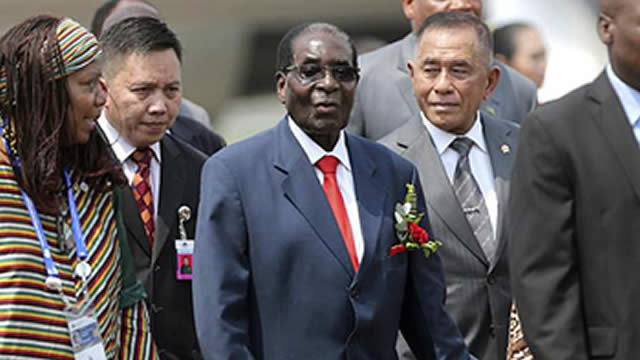Summit vindicates Look East Policy


President Mugabe, accompanied by Indonesian Defence Minister Ryamizard Ryacudu (second from right) and other dignitaries on arrival at Halim Perdanakusuma Airport in Jakarta, Indonesia, yesterday. —AP
From Caesar Zvayi in JAKARTA, Indonesia—
The Asia-Africa Summit which begins here today vindicates the Look East Policy adopted by Government at the turn of the millennium that has seen Zimbabwe strengthening relations with the Asian bloc, Foreign Affairs Minister Simbarashe Mumbengegwi said yesterday. The summit is being held under the theme “Advancing South-South Co-operation”.
Since Zimbabwe’s adoption of the policy, Minister Mumbengegwi said, other countries in Africa, Europe and the United States had followed suit, vindicating President Mugabe’s vision in recognising the importance of the eastern hemisphere in economic and geopolitical terms.
Minister Mumbengegwi is part of President Mugabe’s delegation to the Asia-Africa Summit that coincides with the celebration of the 60th anniversary of the Bandung Conference that was convened by Indonesia’s independence hero, Sukarno in 1955.
President Mugabe, who is accompanied by the First Lady Dr Grace Mugabe, arrived here yesterday morning and was welcomed at Halim Perdanakusuma International Airport by Minister Mumbengegwi, Ambassador to Indonesia Alice Mageza and Indonesia’s Defence Minister Ryamizard Ryacudu and embassy staff.
“The Look East Policy is an important pillar of our foreign policy. As you will recall, our President Cde RG Mugabe was probably the first to enunciate the idea, the importance of the East by pronouncing the Look East Policy. Now it has become a popular phrase where the whole of Africa, the whole of Europe, the whole of America, are now all looking East following the pronouncement of His Excellency, the President.
“So naturally, a forum such as this one where Africa and Asia are meeting in order to work together and co-operate politically and economically is really a resounding vindication of the correctness and foresight of the President who many, many years ago enunciated the Look East Policy and now is being vindicated by this formal partnership between Africa and the countries of the East,’’ Minister Mumbengegwi said.
The Look East Policy has since paid dividends for Zimbabwe, manifesting in nine mega infrastructure deals worth billions of dollars signed during President Mugabe’s 13th State visit to China in August last year to revamp infrastructure in line with Government’s five-year economic blueprint, Zim-Asset that identifies infrastructure development as a key enabler of economic growth.
Trade between Zimbabwe and China has also grown in leaps and bounds totalling $1.1 billion for 2014.
China, along with Russia, have also been instrumental in thwarting attempts by the Anglo-Saxon alliance of Britain and the United States that sought to abuse the UN system to facilitate a military invasion of Zimbabwe.
In this light, the Asia-Africa Summit — which is expected to draw more than 30 heads of state and government — dovetails with Zimbabwe’s development trajectory and foreign policy.
Outlining the Summit agenda, Minister Mumbengewi said the council of ministers met on Monday and came up with three documents that they will recommend to Summit for consideration and adoption.
‘‘Yesterday (Monday) the ministers met to prepare for the summit and principally there are three documents that the ministers are recommending to summit for their consideration and adoption.
‘‘The first one is the Bandung Message which is essentially a political and economic document which underlines the importance of close co-operation between Africa and Asia politically, diplomatically and economically. The document recognises the complementarity of the two regions in the sense that Africa is very much endowed with resources, natural resources and Asia with financial and technological competence,’’ Minister Mumbengegwi said.
‘‘So if the two regions could, in a systematic way, work together they could be able to achieve mutual benefit and mutual co-operation between Africa and Asia. Africa and Asia hold 75 percent of the world population and yet the two regions contribute only 30 percent of global GDP. Clearly there is a lot of potential for the two regions to produce GDP commensurate with their size in terms of population.’’
Of the world’s estimated 7.1 billion people, Africa and Asia are home to 5.4 billion or 75 percent of the world population, with the other four regions: Europe, North and South America, as well as Oceania contributing the other 2 billion.
Foreign direct investment and trade have increased tremendously between the continents, growing from $2.8 billion in 1990 to $270 billion by 2012. And officials say the countries in both regions want to play a greater role in setting global development agendas.
The second document, Minister Mumbengegwi said, seeks to invigorate the new Africa-Asia strategic partnership. This is a relationship that was created 10 years ago, in 2005, as a framework for co-operation between Africa and Asia.
‘‘The invigoration that is required has taken the form of identifying areas where the two regions can co-operate — in the area of infrastructure development, in the peace and security area, countering terrorism, organised crime and in the development area to co-operate in the various economic areas, some of which I have already referred to.
‘‘You can look at the question of energy; you can look at the question of food security which is extremely important and also the question of gender equality and development of women, their participation in the political and economic lives of the two regions,’’ he said.
The third document, Minister Mumbengegwi, relates to the Palestinian question and calls on the occupying power, Israel, to co-operate in the dialogue so that the envisaged two-state solution can be realised.
‘‘We have always supported the genuine struggle of the people of Palestine who are currently under the yoke of occupation by Israel and our position has always been that the most viable solution is having two-states living together, and the Palestinian State having East Jerusalem as its capital. That has been our position and continues to be our position,’’ Minister Mumbengegwi said, adding that there was growing recognition that unless the Palestinian question was resolved there would be no peace in that region.
The Asia-Africa Summit begins today and winds up tomorrow (Thursday), and will be followed by the commemoration of the 60th anniversary of the Bandung Conference that was convened here in April 1955, and laid the groundwork for the formation of the Non-Aligned Movement in Belgrade, in the then Yugoslavia in 1961, based on the principles adopted at the Bandung conference.
The core principles of the Bandung Conference were political self-determination, mutual respect for state sovereignty, non-aggression, non-interference in internal affairs of member states, and equality of nations.







Comments